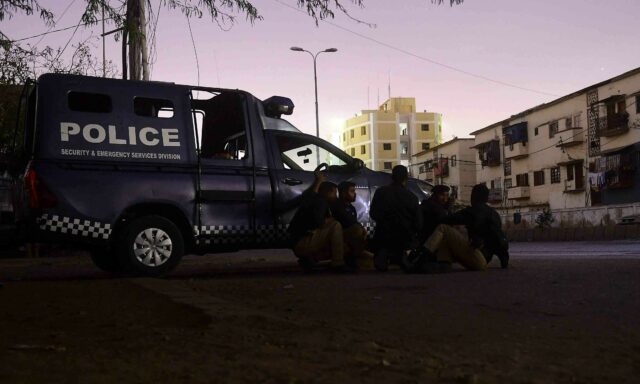
Pakistan Taliban Shifts Strategy to Attack Police in Urban Areas
Publication: Terrorism Monitor Volume: 21 Issue: 8
By:

On February 17, the police chief’s office in Karachi, Pakistan’s largest city, was stormed by militants armed with grenades and automatic weapons. However, security forces killed at least three attackers after four civilians had already been killed inside the building (The News, February 17). The attack was claimed by the Tehreek-i-Taliban Pakistan (TTP), or the “Pakistani Taliban,” in a statement issued by its spokesperson (Dawn, February 17).
This attack on the Karachi police came on the heels of the TTP’s series of other attacks on police across the country in the previous four weeks. For example:
- On January 30, at least 100 people, mostly police, were killed as a result of a deadly suicide blast in a mosque in Peshawar, the capital of Pakistan’s northwestern Khyber Pakhtunkhwa province (Dawn, January 31).
- On February 1, TTP militants armed with automatic weapons attacked a police station in the Mianwali district of Punjab province, and fired at a police station in Makkarwal. The police, however, retaliated and repulsed the attack. The attackers escaped, taking advantage of Mianwali’s complex and inaccessible terrain (Dawn, February 1).
- On February 5, another attack claimed by the TTP occurred near the Police Lines area in Quetta, the capital of the southwestern Balochistan province, injuring five people (Daily Times, February 5).
These attacks reflect the TTP’s strategy to create fear and panic among Pakistani citizens, who mainly rely on police for security in towns and cities.
Why are the Police Under Attack?
The TTP’s strategy is to force Pakistani military and paramilitary forces to engage TTP’s militants in cities. Such attacks receive more national and international media coverage, garnering more attention for the group than a rural attack would. For example, the spectacle created by the involvement of commandos from the Pakistani army’s special service group (SSG) and troops of the Special Operations Wing (SOW) of the paramilitary Pakistan Rangers Sindh in trying to retake the Karachi police office on February 17 garnered significant media attention at home and abroad (Express Tribune, February 17). Media coverage emphasized the TTP’s ability to conduct such a high-profile attack on a hard target.
Compared with the armed forces, Pakistan’s police are considered a relatively easy target for the TTP to attack, as they are not trained to repulse militants or undertake counter-terrorism operations. This would be why the Karachi police chief’s office was not recaptured and the TTP militants eliminated until the armed forces arrived. Until police in Pakistan are able to develop the capacity to conduct counter-terrorism operations, this issue will remain.
By launching a series of attacks on police in major cities, the TTP has shifted the theater of war from the tribal areas along Pakistan’s border with Afghanistan to more densely populated areas. This is reflective of the TTP’s goal to break down law and order across the country. Moreover, Pakistan’s urban population have begun protesting to demand greater security in the face of the TTP’s recent wave of attacks, in particular following the suicide attack launched against the police in the mosque in Peshawar on January 30 (Dawn, February 7).
The TTP’s raids on police stations in major cities further raises questions about the efficacy of the country’s counterterrorism policy. As far as the TTP is concerned, Pakistan has so far pursued a policy of “talk and fight.” However, this has emboldened the TTP to hit targets across the country more broadly, since negotiations have proven futile or end up serving as a stalling tactic for impending Pakistani military operations (Dawn, February 18).
Conclusion
The TTP, which has various historical and ideological linkages with the Afghan Taliban, executed more than 100 attacks last year. Most of them occurred after the group’s peace talks with the Pakistan government—mediated by Taliban in Kabul—failed in August 2022. Later, in November 2022, the TTP called off the ceasefire with the government that had been agreed to in June 2022, threatening to stage attacks across the country in retaliation for continued military operations against the TTP (Dawn, November 28, 2022). The Pakistani military now regrets these talks. Federal Human Rights Minister Riaz Pirzada accordingly claimed that Lieutenant General Faiz Hameed, former Director-General of Inter-Services Intelligence (ISI), had suggested that “they [TTP] should be brought into the mainstream but it backfired” (Dawn, February 19).
Pakistan has been left questioning how the TTP was able to breach the security around police stations and stormed police offices. The country must invest in internal security to provide safety to its citizens, especially now in towns and cities. For a country on the verge of economic default and struggling with political turmoil, however, this seems an insurmountable challenge.



